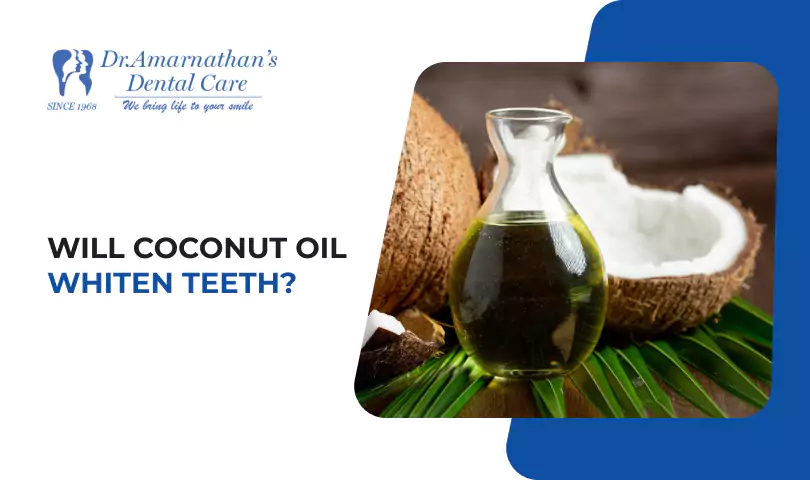
Will Coconut Oil Whiten Teeth?
Coconut oil has recently gained popularity in the beauty and health industries, particularly in the field of oral hygiene. One of the most popular trends is to use coconut oil for whitening teeth, a technique known as oil pulling. This natural, chemical-free technique has grabbed the curiosity of many people looking to whiten their teeth without the negative effects of traditional whitening procedures. But does coconut oil truly provide the bright smile you seek? Let’s have a closer look.
Why Coconut Oil?
Coconut oil contains lauric acid, a fatty acid renowned for its antibacterial and anti-inflammatory effects. These features have made it an appealing alternative for natural dental care, especially for those who want to avoid the chemicals included in typical whitening products.
How Does Oil Pulling Work?
Oil pulling for teeth whitening is a traditional practice in which you swish coconut oil in your mouth for a lengthy period of time, often 10-20 minutes. The technique is believed to extract toxins and germs from your mouth, which are then held in the oil and eliminated when you spit it out. This not only improves dental hygiene, but it is also supposed to gradually whiten teeth.

Will Coconut Oil Whiten Teeth?
There is minimal scientific evidence for the question, “will coconut oil whiten teeth?”. Many people see noticeable effects of coconut oil for whitening teeth. Unlike chemical tooth whiteners, coconut oil operates in a more subtle way. Its inherent antibacterial and antiseptic characteristics aid in the reduction of plaque and gingivitis, both of which can result in tooth discoloration. Coconut oil for whitening teeth is not bleached, but eliminating plaque and keeping healthy gums helps brighten and clean your smile.
Coconut Oil vs. Commercial Teeth Whiteners
When comparing coconut oil for whitening teeth to professional whitening solutions, there are a few important differences:
Immediate results: Commercial treatments, particularly those that include hydrogen peroxide, provide faster and more obvious whitening results. Coconut oil, on the other hand, operates slowly and may take many weeks or months to produce benefits.
Enamel Safety: One advantage of coconut oil for whitening teeth is, it is non-abrasive and good for enamel. Some commercial solutions, particularly those containing powerful bleaching chemicals, might degrade enamel over time, potentially causing sensitivity or injury with continued usage.
Natural Approach: Coconut oil for whitening teeth is a natural, harmless option that appeals to people who seek holistic and chemical-free treatments. Traditional whiteners, while effective, may include harsh chemicals that some people choose to avoid.

Step-by-Step Guide to Oil Pulling
To try coconut oil for whitening teeth, just follow these easy instructions:
Start with a tablespoon of coconut oil: Coconut oil can be liquid or solid; if solid, just let it melt in your tongue.
Oil swish in your mouth: For ten to twenty minutes, swirl the oil in and out of your teeth and around your gums. More bacteria and poisons might be absorbed by the oil the longer you swirl.
Gently spit it out: The oil includes poisons and bacteria from your mouth, so avoid swallowing it.
Make sure you brush your teeth: To keep your breath fresh and get rid of any remaining oil, clean your teeth as usual thereafter.
Benefits of coconut oil for whitening teeth
If teeth whitening isn’t the main benefit of coconut oil, there are still a number of other benefits for dental health:
Reduces bad breath: For some people, oil pulling is a more effective way to freshen breath than mouthwash since it eliminates dangerous bacteria.
Stops cavities: Your risk of cavities may be lowered by coconut oil’s capacity to inhibit Streptococcus mutans and other dangerous bacteria.
Encourages gum health: Gingivitis and other gum problems may be avoided with regular oil pulling, which also reduces inflammation and enhances gum health.
Antibacterial Properties: Coconut oil includes lauric acid, which is believed to eliminate harmful germs in the mouth, perhaps improving the look of teeth.
Gentle on enamel: Unlike some whitening treatments that include harsh chemicals, coconut oil is mild and does not degrade enamel, making it a safe choice for daily usage.

What Are the Limitations?
While many individuals swear by oil pulling, it’s essential to have reasonable expectations. Coconut oil whiten teeth, However, the outcomes may vary from person to person. It will not provide you with the immediate benefits that commercial whitening treatments offer, and it may take weeks or months of constant application to see a change. There are more effective whitening alternatives than coconut oil. However, coconut oil for whitening teeth is a natural method of maintaining dental health that can be included in a healthy lifestyle.
Conclusion
In conclusion, coconut oil for whitening teeth offers a mild, natural way to promote overall dental health, even though it might not have the immediate, dramatic whitening effects of commercial treatments. Over time, frequent oil pulling with coconut oil can help to brighten teeth by reducing plaque and promoting healthy gums. While it is not a direct teeth whitener, its antimicrobial qualities contribute to a healthier, cleaner mouth, which can gently lighten your teeth color. If you’re looking for a non-chemical substitute that will show effects over time, you should definitely include coconut oil in your dental care regimen.




